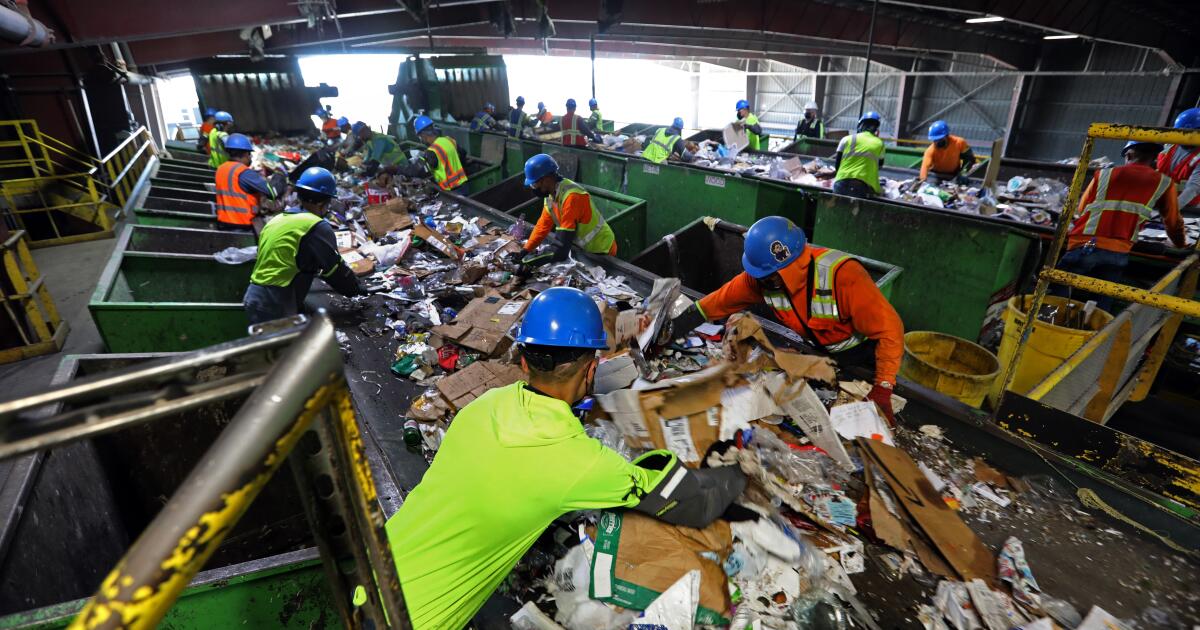They are used to give plastic products their distinctive durability, bendability and sleek, nonstick surface.
Yet some of these chemical additives have been tied to maladies such as breast and prostate cancer, heart disease and diabetes, as well as problems with children’s brain development and adult fertility.
Of particular concern are a class of additives known as endocrine disruptors — chemicals that mimic and confuse hormone signaling in humans.
Now, a team of physicians, epidemiologists and endocrinologists have estimated the costs of plastic exposure on the U.S. healthcare system and come to a sobering conclusion.
“What this study tries to do is to say” to plastic manufacturers that “‘it’s not just that you’re hurting people’s lives, it’s that you’re costing the economy. … You are profiting as companies off the backs of people’s health and well-being,’” he said.
Plastic manufacturers and the companies who use those containers don’t care what it does to us. They just don’t want to be forced to spread manufacturing out, to save on increased transportation costs that would come from using glass containers instead.
But that’s what gov’ts have to do to change anything … shut down plastic usage and/or force those companies who use them to pay for the environmental damage and cost of healthcare.
increased transportation costs that would come from using glass containers instead
So spend more gasoline to move an order of magnitude more weight around? Just weighed two roughly equivalent containers, ~6 fluid ounces each.
Glass: 105g
Plastic: 7g
(That measurement misses the metal lid on the glass container vs. a plastic lid or wrap. Add 10g and 1g to the totals.)
Ah, but I see you’re proposing to spread manufacturing out some, save on shipping? So thousands of new glass plants splattered everywhere? The shipping costs sound more environmentally effective than splatting thousands of acres of forest, creating more heat islands, etc. And don’t forget all the extra energy infrastructure to power those plants! But what do I know.
Say what you will about capitalism, but it finds ways to use money efficiently. And here’s the thing people miss; Energy = MONEY. That equation exhibits the commutative property. Money = ENERGY.
I’m leaving out the increase in food costs to consumers. Like it isn’t bad enough, we should add more? Also, are we going to add more burden to the people that have to lift and move all that glass?
Posted a time or two that sometime in the future our plastic use will be looked upon as vile, insane. I can rage forever on the subject. But we’re not at a place in history to completely get around it. Not yet. Baby steps.
And BTW, I LOVE glass! I’ve made so many cool things out of waste. But fuck me, there’s only so many drinking glasses, bowls, jewelry, etc., a man can make and use. I’ve got 300lbs of waste glass in the shed to work with, nowhere to put the finished product.
tl;dr: The only way we save this planet is renewable energy, and I include nuclear in that. Any other talk is missing the energy equation, missing the forest for the trees.
It’s so hard to break away from plastics. I switched out my Tupperware to glass and use a stainless steel water jug while at work, but everything comes in plastic. My yogurt this morning? Plastic container. The package for my coffee filters? Plastic. The ground beef for dinner tonight? Styrofoam tray wrapped in plastic.
Which is worse- filtered water out of a bottle or tap water in a glass? I know you can filter tap water, but disregard that.
You’re also assuming that the bottle water is filtered. Some of those companies just bottle up tap water.
The unfiltered tap water vs bottled water debate is location dependent.
I live in NYC and the tap water is damn good.
Probably because of all the crustaceans.
Wait they are added in?
Unfiltered tap water is great, but we’ve got real fine tap water in Europe. When hiking I’ve drunken water directly from springs, no need to filter it.
Heck, even water filters can shit out nanoplastics
True but it’s likely to shit out less plastic than water bottles. The water is only in contact with the filtering medium for a short period where as bottled water is sitting there for weeks/months/years potentially sitting in direct sunlight.







